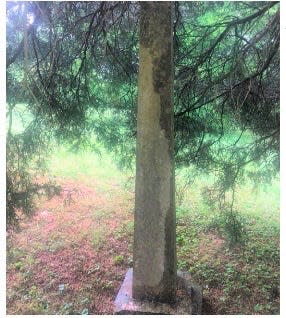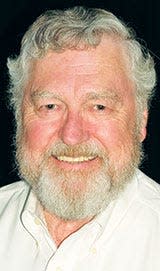Early history of Robertsville: 1850-1880

In this the third in the series, Dennis brings us the history surrounding the Civil War and the first African American school in Anderson County.
***
By the 1850s, Robertsville continued to grow and so did Collins Roberts wealth but not without issues. In 1851, Collins faced a legal dilemma challenging his mental competence. A Report of Jury of C. Roberts signed by 12 Robertsville jurors was presented to the Anderson County Court.
Report of Jury for C. Roberts:
We the undersigned free holders of Anderson County being duly summoned and sworn to inquire into the mental condition of Collins Roberts having fully investigated the matter to find that he is a lunatic and incapable of managing his affairs with safety to himself and others. We also find that there is danger if he should go unrestrained of his committing violence on his wife and perhaps other members of his family and also upon his slaves. We further find that he possessed of a large amount of real and personal estate which we have not had time and opportunity to and with any exacting or certainty. Nov. 22, 1851, James Holliman, William Davidson, John Rutherford, John McAdoo, John Courtney, D. L. Bradley, Cheslay Jarnigan, William Tunnell, William Cross, Lazarus Moore, Larken Hackworth, and James Hall.
Apparently, no action was taken from this Jury report; the 1860 census indicated that Collins Roberts retained all his personal real estate and assets.

The deteriorating relationship between Collins and his wife Sarah in the late 1850s ultimately ended in a divorce. In the 1800s divorces had to be granted by the state legislature. There appears to be no information substantiating that a divorce between Collins and Sarah occurred; however, local historians such as Snyder Roberts indicated that this divorce did indeed happen.
What is known is that according to the 1860 Federal U.S. Census, Sarah and Collins were living separately. Sarah was enumerated as living with son James in the Ross Community in Dutch Valley.
Just before the Civil War in 1860, Robertsville was a vibrant community with a population of 840 citizens. However, the war would take a terrible toll on this community. Comparing the 1860 U.S. Federal Census to the 1870 census, there was a decrease of population from 840 to 720 citizens. Additionally, due to the Civil War, many Robertsville families’ financial worth drastically decreased over this ten-year period.
Not only did the economy suffer, but also the divided political loyalties created hardships. One such tragic incident occurred in Robertsville just after the Civil War ended.
Confederate Pvt. Ethelbert Crozier’s joyous return home to his parents Clark and Abiah would be short lived. Being the son of Abiah, Ethelbert was also the grandson of Collins Roberts. Ethelbert had previously been properly paroled from his service with the 8th Confederate Tennessee Calvary after its surrender to Union forces.
On May 25, while staying with his parents, Ethelbert was sequestered by three Union soldiers and then summarily executed in front of his mother, father, and his sister. The reasoning for this “execution” was unclear to his mother. Abiah documented in her grievance letter to the Provost Marshall that no charges were made by the Union soldiers before killing him. They shot him once, contemplated shooting him again but decided not to. Next, they tore his pardon up, threw it on the ground and then walked away.
Research by Theodore Urbanski revealed that these three Union soldiers were believed to be assigned to the 9th Tennessee Union Calvary. This unit was operating in the Robertsville area rounding up Confederate bushwackers and irregulars who were attacking and sometimes killing local Union sympathizers.
However, it appears that Pvt. Ethelbert Crozier’s murder in Robertsville was more of a revenge killing. The three Union soldiers’ hatred for the Confederate unit Ethelbert Crozier served in had, no doubt, influenced their actions. After the Battle of Saltville, Virginia, in 1864, this confederate unit was associated with the massacre of both White and Negro Union soldiers.
Abiah Crozier began her search for justice of her son’s murder. On June 7th, she wrote a letter to the Provost Marshall in Knoxville, Tennessee, substantiating her son’s innocence and asking that the three unknown perpetrators be identified and brought to justice. Three soldiers, Peter Driscoll, Ed Franklin, and James Holden were identified and arrested by the Provost Marshall.
Sadly, the results of the Provost Marshall’s investigation produced nothing for Abiah. The standing military orders stated that these soldiers were to capture outlaws and treat them as prisoners as they are entitled to a trial. However, the orders further stated that “anyone found with arms without authority of federal officers will be treated as public enemy and as an outlaw and to be killed like a mad dog by anyone who meets them.”
After the investigation, there was apparently not enough evidence to convict the soldiers and the matter was forgotten. Abiah’s plea for justice of the murder of her son went unheeded.
The 1870s saw profound changes in Robertsville. As more families relocated here, there was progress in education. Two schools, the Whittier School, and the Robertsville Academy, provided the first opportunities for local children to receive a formal education.
Robertsville can boast of having the first African American school in Anderson County. Named the Whittier School, it was located on the crest of Pine Ridge just north of where South Illinois Avenue crosses the ridge. Research by Anderson County Historian Katherine Hoskins revealed that the land for this school was donated by Andrew Freeman, a freed slave.
This land was deeded to the Eighth District school directors for the construction of a Negro school and church. The deed stated in part that Freeman did this “as a token of his high regard for the religious interests of his county and his desire for the instruction and elevation of his race.” Opened in 1870, it was funded by subscription of one dollar per student per month. Initially, twenty-one African American students enrolled.
In 1875, the General Assembly of Tennessee passed the Charter Act that helped fund private schools in Tennessee. The applications for the charters stated that it was to educate the youth of the country in all the branches of learning. Ironically, this funding came from the collection of poll taxes that was used to marginalize African Americans and poor whites from voting.
***
Dennis has brought us details about the post-Civil War era that I dare say is known by very few. He uncovered a murder that went unpunished. In the fourth in the series and the final column, Dennis will bring us the story of the hidden gold in Robertsville.
This article originally appeared on Oakridger: Early history of Robertsville: 1850-1880
